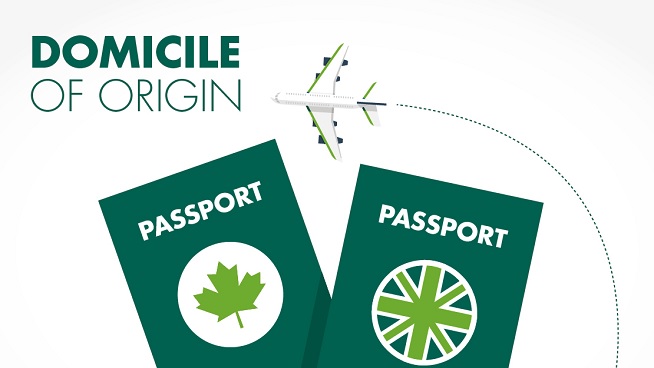One of the key concepts in any financial planning is the residency and domicile status of your client. In this article, I’m going to focus on UK domicile.
There are, since 2013, five types of UK domicile, and a number of ways they can be acquired.
Domicile of origin
This is the domicile that is acquired at birth. It is normally taken from your father; however, if parents are unmarried or the child is born after the father’s death, then the mother’s domicile is normally acquired.
It is important to note that the domicile of origin can differ from the country of birth, as it follows the domicile of the relevant parent.
 Let’s look at an example:
Let’s look at an example:
Rebecca and James (married, resident and domiciled in the UK) migrated to Canada for Rebecca’s employment on a 5 year contract. Some years later, their son, Ben, is born. Ben is Canadian and British in nationality but, as James hasn’t acquired a domicile in Canada, Ben has a UK domicile of origin even though he has not stepped on UK soil.
Under the general law, an individual will retain their ‘domicile of origin’ until a different domicile is acquired – either a ‘domicile of dependency’ or a ‘domicile of choice’.
Domicile of dependency
A child’s domicile will follow the person on whom they are legally dependent. So if the domicile of that person changes, the child’s domicile will change and replace the domicile of origin. If the father’s domicile changes after the birth of the child, the child follows the new domicile as a domicile of dependency. This happens until the child reaches 16.
 Let’s return to the example:
Let’s return to the example:
So, if Rebecca and James decided to stay in Canada, and James acquired a domicile of choice there before Ben reached 18, their son’s domicile will change accordingly. Ben’s new domicile of dependency will replace his domicile of origin.
Domicile of choice
An individual can try to acquire a new domicile (a domicile of choice) by settling in a new country with the intention of living there permanently. However, it is very difficult to acquire a new domicile as there are no fixed rules or requirements and the burden of proof falls on the individual to prove they have acquired a new domicile. Living in another country for a long time, although an important factor, does not prove a new domicile has been acquired. There also needs to be clear evidence of the individual’s intention to live there permanently.
As well as considering an individual’s long term intentions, the UK’s HM Revenue and Customs (HMRC) make a judgement after reviewing the ties with the domicile of origin and those with the domicile of choice. Disposing of assets in the country in which you were previously domiciled may help support a claim. It is unlikely that a domicile of choice will be acquired if there are still ties (other than insignificant ones) with your domicile of origin.
 Let’s return to the example:
Let’s return to the example:
Many years later, having left Canada, Rebecca and James move to Hong Kong and acquire permanent residency status. They have few ties with the UK. However, as they cannot acquire a ruling from HMRC, and recognise that, for health or family reasons, many expatriates invariably return to the UK, they decide to continue planning as if they are UK domicile for the sake of Ben’s eventual inheritance.
Deemed domicile
Non-UK domiciled individuals who have been UK resident for 15 of the previous 20 tax years become deemed UK domiciled for all tax purposes.
 Let’s look at an example:
Let’s look at an example:
Michelle, a Singaporean, first moved to the UK for undergraduate studies but has continued residing in the UK ever since. She has been residing in the UK for the past 20 years and married her long-time boyfriend Daniel. For UK inheritance tax (IHT) planning purposes, Michelle will be deemed a UK domicile.
Elected domicile
Since 6 April 2013, a non-domicile person married to a UK domicile person has been able to elect to be treated as a UK domicile for UK IHT purposes
 Let’s look at an example:
Let’s look at an example:
Andrew married Mika, who is Japanese, when he was working in Japan. After several years, Mika and Andrew decide to move to the UK. For UK IHT planning purposes, as it is a mixed domicile marriage, the spousal exemption (from domicile to non-domicile spouse) is limited to £325,000.
However, Mika can elect to be a UK domicile to enjoy full spousal exemption. As such, Mika and Andrew can transfer assets between themselves to mitigate their IHT tax liability. IHT will only be payable on the second death.
Conclusion
The ongoing challenge for financial advisers is to review a client’s individual circumstances and ensure that a client is aware of what their current domicile is and if any uncertainty prevails, what steps (if any) can be taken to remove this uncertainty, or to plan to reduce the estate accordingly.
It is always advisable to plan for the worst and hope for the best, so that a negative posthumous determination by HMRC does not reduce an inheritance.
I have briefly touched on some of the key concepts of domicile which is a complex area, but is an essential part of the financial planning process.
The information provided in this article is not intended to offer advice and is for financial advisers only. It is based on Old Mutual Wealth’s or Old Mutual International’s interpretation of the relevant law and is correct at the date this blog was published. While we believe this interpretation to be correct, we cannot guarantee it. We cannot accept any responsibility for any action taken or refrained from being taken as a result of the information contained in this blog.








